|
|
|
Sort Order |
|
|
|
Items / Page
|
|
|
|
|
|
|
| Srl | Item |
| 1 |
ID:
173036
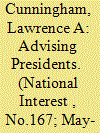

|
|
|
|
|
| Summary/Abstract |
Richard Nixon’s chief interlocutors included a contemporary international business executive, Maurice R. Greenberg, as immersed in international commerce as Nixon was in geopolitical strategy. His unique insights into global affairs have been invaluable to American presidents.
|
|
|
|
|
|
|
|
|
|
|
|
|
|
|
|
| 2 |
ID:
144614
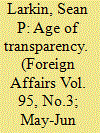

|
|
|
|
|
| Summary/Abstract |
Transparency has long been a rare commodity in international affairs. But today, the forces of technology are ushering in a new age of openness that would have been unthinkable just a few decades ago. Governments, journalists, and nongovernmental organ¬izations (NGOs) can now harness a flood of open-source information, drawn from commercial surveillance satellites, drones, smartphones, and computers, to reveal hidden activities in contested areas—from Ukraine to Syria to the South China Sea
|
|
|
|
|
|
|
|
|
|
|
|
|
|
|
|
| 3 |
ID:
177621
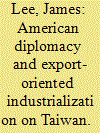

|
|
|
|
|
| Summary/Abstract |
Scholars have pointed to the period 1958-1962 as the beginning of Taiwan's transition to export-oriented industrialization. Although the Nationalist Party (KMT) had traditionally supported state socialism, the KMT began to oversee economic reforms in the late 1950s, setting Taiwan on the course of export-led growth under a capitalist model. Using archival materials from both the United States and Taiwan, I argue that the reforms resulted from U.S. influence on how the KMT understood the role of economic development in its grand strategy. U.S. arguments succeeded in creating political support at the highest levels of the KMT leadership for a reform-oriented faction in the economic bureaucracy. This finding shows how an aid donor can promote economic reforms even when the recipient is strategically important for the donor: although threats to enforce conditionality may not be credible, the donor can influence the recipient through persuasion.
|
|
|
|
|
|
|
|
|
|
|
|
|
|
|
|
| 4 |
ID:
161762
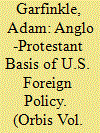

|
|
|
|
|
| Summary/Abstract |
U.S. foreign policy thinking is based ultimately on the particular historical experience and cultural legacy of the American founding, and at the very base of that founding is the preeminence of Anglo-Protestantism. The religious heritage of the United States, a sixteenth century blend of a theological reformation and the rise of modernity in the Enlightenment, has endowed American politics with a predisposition for egalitarian, anti-hierarchical, and contractual forms, and that disposition applies as well to foreign affairs. The syntax, but not the content, of Anglo-Protestantism shapes basic attitudes particularly when political elites face crisis situations, but it is institutionalized in government and society at all levels. Six examples from the post-World War II period illustrate the case.
|
|
|
|
|
|
|
|
|
|
|
|
|
|
|
|
| 5 |
ID:
163944
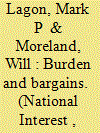

|
|
|
|
|
| Summary/Abstract |
Burden-sharing is not just the vogue du jour. It has been a longstanding U.S. desire and is much merited. Yet qualitative, beneficial burden-sharing requires leadership.
|
|
|
|
|
|
|
|
|
|
|
|
|
|
|
|
| 6 |
ID:
165655


|
|
|
|
|
| Summary/Abstract |
What factors account for the increasingly erratic U.S. policy towards China, marked by growing domestic divisions and tensions over means and ends? Can the United States contain China, as called for by its military leaders and a growing segment of corporate America? Or, can the Sino-American rivalry be managed peacefully and without plunging the world into depression? The preoccupation with rhetoric and agency in the analysis of U.S. foreign policy overlooks the role of social forces and class interests. The confusion and vacillation in U.S. trade policy are amplified by the manifest dysfunctions of the Trump administration, but they ultimately reflect a deeper, double logic, expressing not only the “Thucydides trap” in which a declining but still formidable hegemon contemplates submission to a rising power but also a crisis of neoliberalism.
|
|
|
|
|
|
|
|
|
|
|
|
|
|
|
|
| 7 |
ID:
147563
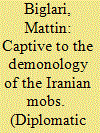

|
|
|
|
|
| Summary/Abstract |
Making use of recently declassified documents, in this article I examine the U.S. government’s perceptions about Shi’a Islam during the time of the Iranian revolution, 1978–9. I show how lower ranking officials in diplomatic and intelligence circles came to the common conception of Shi’ism as being a uniquely populist religion with an inherent propensity towards revolutionary instability, as demonstrated in its doctrines, rituals and history. These perceptions influenced higher levels of government, including President Carter himself. I then explore how analysts and policymakers conceptualized the religious leadership in Iran, especially Khomeini. I show that although opinion was divided about whether Khomeini represented U.S. interests, the prevailing view was to oppose him because of his populist tendencies empowering the Iranian masses, which senior policymakers had come to see as integral to Shi’ism itself. As a result, I argue, although the wider Cold War context dictated the U.S. government’s attempt to maintain diplomatic relations with the new Iranian regime in 1979, this was to be done without overtures to Khomeini, long before the Hostage Crisis.
|
|
|
|
|
|
|
|
|
|
|
|
|
|
|
|
| 8 |
ID:
094748
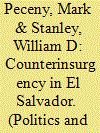

|
|
|
|
|
| Publication |
2010.
|
| Summary/Abstract |
Contemporary U.S. policy makers often characterize the U.S. counterinsurgency experience in El Salvador as a successful model to be followed in other contexts. This article argues that these characterizations significantly overstate the positive lessons of El Salvador, and ignore important cautionary implications. During the first part of the conflict, neither the Armed Forces of El Salvador (FAES) nor the U.S. followed the tenets of counterinsurgency doctrine. The FAES killed tens of thousands of non-combatants in 1979 and 1980, before the civil war even began. This repression may have preempted an incipient popular insurrection, but it also locked in a determined social base that enabled the armed left to build a highly effective and sustained insurgency. In 1984, the U.S. had to save the FAES from likely defeat through a major increase in military aid, especially airpower. When the Farabundo Martí National Liberation Front (FMLN) switched to a classical guerrilla strategy, the FAES, despite considerable U.S. aid, seldom followed best practices in counterinsurgency. Democratization and redistributional reforms were partial and flawed in implementation. The war settled into a stalemate that would likely have continued indefinitely had it not been for the collapse of the socialist bloc and significant changes in the interests of Salvadoran elites that were largely incidental to U.S. policies.The most important cautionary lesson is that indiscriminate violence against civilians early in a conflict can create dynamics that are very difficult to overcome in subsequent stages.
|
|
|
|
|
|
|
|
|
|
|
|
|
|
|
|
| 9 |
ID:
173035
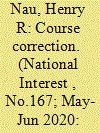

|
|
|
|
|
| Summary/Abstract |
Trump is providing a course correction for the postwar global order that may be the best hope for sustaining it. His policies may moderate the radical changes of the past seventy-five years, but they are unlikely to reverse them.
|
|
|
|
|
|
|
|
|
|
|
|
|
|
|
|
| 10 |
ID:
189083
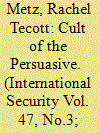

|
|
|
|
|
| Summary/Abstract |
Security assistance is a pillar of U.S. foreign policy and a ubiquitous feature of international relations. The record, however, is mixed at best. Security assistance is hard because recipient leaders are often motivated to implement policies that keep their militaries weak. The central challenge of security assistance, then, is influence. How does the United States aim to influence recipient leaders to improve their militaries, and what drives its approach? Influence in security assistance can be understood as an escalation ladder with four rungs: teaching, persuasion, conditionality, and direct command. Washington increasingly delegates security assistance to the Department of Defense, and the latter to the U.S. Army. U.S. Army advisers tend to rely exclusively on teaching and persuasion, even when recipient leaders routinely ignore their advice. The U.S. Army's preference for persuasion and aversion to conditionality in security assistance can be traced to its bureaucratic interests and to the ideology that it has developed—the cult of the persuasive—to advance those interests. A case study examines the bureaucratic drivers of the U.S. Army's persistent reliance on persuasion to influence Iraqi leaders to reform and strengthen the Iraqi Army. Qualitative analysis leverages over one hundred original interviews, as well as oral histories and recently declassified U.S. Central Command documents. The findings illustrate how the interests and ideologies of the military services tasked with implementing U.S. foreign policy can instead undermine it.
|
|
|
|
|
|
|
|
|
|
|
|
|
|
|
|
| 11 |
ID:
148081
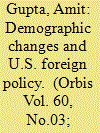

|
|
|
|
|
| Summary/Abstract |
The demographic shift in America may well strengthen U.S. foreign policy, as well as military capability and economic competitiveness. In a globalized world, America's ethnic diversity, the innovation that comes from bringing the best and the brightest from around the world to this country, and the fact that a diverse population becomes a stakeholder class could all work to ensure that the United States remains the most influential nation in the world.
|
|
|
|
|
|
|
|
|
|
|
|
|
|
|
|
| 12 |
ID:
183292
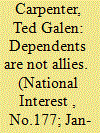

|
|
|
|
|
| Summary/Abstract |
Many of America’s so-called allies are major liabilities rather than assets to U.S. foreign policy. Indeed, they are potential snares, ones that can entangle America in unnecessary military confrontations.
|
|
|
|
|
|
|
|
|
|
|
|
|
|
|
|
| 13 |
ID:
089279
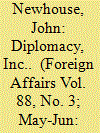

|
|
|
|
|
| Publication |
2009.
|
| Summary/Abstract |
The area around K Street in Washington, D.C., abounds with lobbyists, many of whom represent foreign governments or entities. Although some major foreign governments continue to work mainly through their embassies in Washington, nearly one hundred countries rely on lobbyists to protect and promote their interests. The subculture of public relations and law firms that do this kind of work reflects a steady decline and privatization of diplomacy -- with an increasing impact on how the United States conducts its own foreign policy.
|
|
|
|
|
|
|
|
|
|
|
|
|
|
|
|
| 14 |
ID:
181591
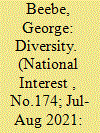

|
|
|
|
|
| Summary/Abstract |
Diversity in the U.S. foreign policy community helps ensure that our government officials “look like America” and consider a range of views in making policy choices. When it comes to the who in making foreign policy, inclusivity is in
|
|
|
|
|
|
|
|
|
|
|
|
|
|
|
|
| 15 |
ID:
087220
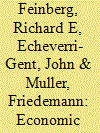

|
|
|
|
|
| Publication |
Overseas Development Council, 1990.
|
| Description |
247p.
|
|
|
|
|
|
|
|
|
|
|
|
Copies: C:1/I:0,R:0,Q:0
Circulation
| Accession# | Call# | Current Location | Status | Policy | Location |
| 032413 | 337.1/FEI 032413 | Main | On Shelf | General | |
|
|
|
|
| 16 |
ID:
155288
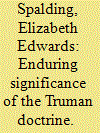

|
|
|
|
|
| Summary/Abstract |
The Truman Doctrine is seventy years old, which means it could easily be considered an artifact of history. In the age of Donald J. Trump, one might reasonably ask, what use is there for a doctrine that set forth the grand strategy of containment? Regardless of the Cold War, the doctrine’s essential pieces—applying a combination of political, economic, and military strength; building regional and bilateral alliances based on collective defense; cultivating existing liberal democracies and future liberal democratic regimes; containing totalitarianism and promoting its demise; and fostering an American-built-and-led liberal world order—are still being or should be used. At the present, critical time when national security threats issue from revisionist great powers, lesser-yet-still-hostile state and non-state actors, and WMDs and cutting-edge technologies in the hands of all these entities, it is important to understand not only the Truman Doctrine’s origins but also the reasons that the fundamental insights of this grand strategy should still inform U.S. foreign policy.
|
|
|
|
|
|
|
|
|
|
|
|
|
|
|
|
| 17 |
ID:
089281
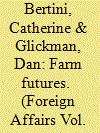

|
|
|
|
|
| Publication |
2009.
|
| Summary/Abstract |
It is not easy for Americans to understand the starvation that afflicts much of the developing world. Families in the poorest parts of Africa and Asia spend up to 80 percent of their incomes on food; for the average U.S. household, that would mean an annual grocery bill of $40,000. Yes, there are hungry Americans in the millions, and the U.S. food-stamp program is operating at record levels. But hunger in the United States does not put tens of thousands of infants into hospitals and require them to be hooked up to feeding tubes. Nor does it lead to stunting, wasting, and debilitating forms of malnutrition, such as kwashiorkor and marasmus.
|
|
|
|
|
|
|
|
|
|
|
|
|
|
|
|
| 18 |
ID:
087731
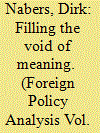

|
|
|
|
|
| Publication |
2009.
|
| Summary/Abstract |
The paper aims to shed light on the conceptual link between international crises such as the one following September 11, 2001, and processes of identity construction through foreign policy. Crisis and identity construction are conceptualized as constant political phenomena. The political process is constituted by meaningful acts of social agents, and can thus only be grasped by analyzing meaning. Meaning is transmitted by language. Meaningful language is never reducible to individual speakers; it is a social act. The sum of articulatory practices in a social field is called discourse. Linking Critical Discourse Analysis (CDA) with the theory of hegemony developed by Ernesto Laclau and Chantal Mouffe, I will be able to show how hegemonic discourses serve as the nexus between the discursive construction of crises and identity change. A number of problems will be acknowledged when linking these two strands of thinking, as CDA and Laclauian theory work with tentatively different conceptions of discourse. The construction of the "war on terror" by the Bush administration between September 2001 and May 2003 is used as a case to illustrate the theoretical argument.
|
|
|
|
|
|
|
|
|
|
|
|
|
|
|
|
| 19 |
ID:
168045
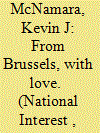

|
|
|
|
|
| Summary/Abstract |
U.S. foreign policy will need to blunt European Union policy in order to compete for the loyalties of allies in Central Europe.
|
|
|
|
|
|
|
|
|
|
|
|
|
|
|
|
| 20 |
ID:
086349
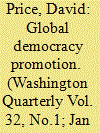

|
|
|
|
|
| Publication |
2009.
|
| Summary/Abstract |
A professed commitment to worldwide democracy promotion has been a hallmark of U.S. foreign policy for many years and was given a distinctive emphasis by the outgoing administration. President George W. Bush calls it "the urgent requirement of our nation's security, and the calling of our time."1 Promoting democracy, however, is not merely a matter of advocacy via an international megaphone. Policies of the Bush administration have led many to question the methods used to promote democracy or even the goal itself. Despite such criticism, much of it warranted, democracy promotion remains a central plank of U.S. foreign policy, an expression of U.S. values, and a tool that can be used to pursue the strategic interests of the United States. It is critically important, therefore, to learn from the mistakes of the past seven years and to rethink and refine the theory and practice of democracy promotion.
|
|
|
|
|
|
|
|
|
|
|
|
|
|
|
|
|
|
|
|
|